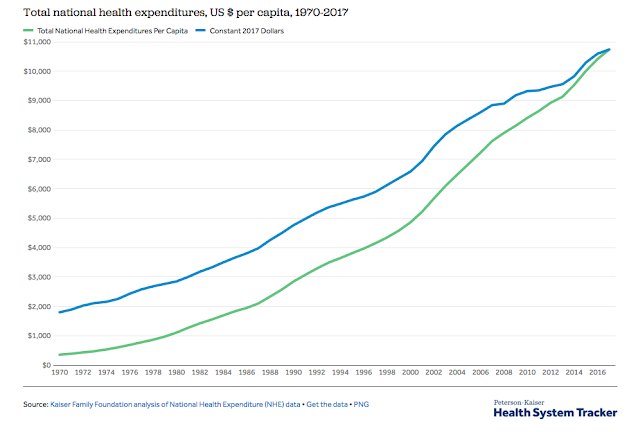Bernie Sanders introduced his proposal last week. Predictably, it is short on details and makes no mention of how it would be paid for.
It is claimed that going to a government-run single payer program will massively reduce administrative expenses and lower health care costs for the American public. In so doing, private insurance companies, and their "obscene profits", will be eliminated from the system.
I have written before how the facts about healthcare costs are often much different than it is portrayed by politicians and understood by most of the public at large.
For example, one fact that is often overlooked is that the average cost per day for a hospital stay is actually higher in a non-profit hospital than in a for-profit hospital. The costs are also higher in a state/local government run hospital than a for-profit one. I wrote about this in 2013 but it is still true today.
This is exactly the opposite of what Democrats would have you believe when they argue that healthcare should be a not-for-profit government function. They argue government or non-profits are able to deliver healthcare better and cheaper as there is no profit motive adding to costs.
Here are the latest average costs per inpatient day for hospitals based on ownership according to the Kaiser Family Foundation. All of the other charts below are also from the KFF with the exception of the out-of-pocket expenditures by country comparison chart which is based on WHO data.
When you consider that hospital costs are the biggest component of national health expenditures, it would seem to be a pretty significant fact that for-profit hospitals are over 20% less costly than non-profits.
Why is this? I explained in my previous post.
A big reason for the higher costs with non-profit hospitals is the lack of accountability. They are not accountable to tax collectors, shareholders, and most particularly, patients (due to our third party payment system where it is rare that the bill is paid by the person receiving the treatment).
How about another fact that most people are not aware of? Many complain about high deductible plans today, which has meant more out-of-pocket spending by patients. However, the reality is that out of pocket costs still make up only 11% of total U.S. health care expenditures in the United States. In 1970, it was 33%.
Americans are also paying less of the total share of national health expenditures in out-of-pocket expenses than other countries.
How much better can it get on this score? Would "Medicare for All" lower these "out of pocket" costs? Our out of pocket costs are already lower than in the "socialist" systems.
Let's also look at the components of U.S. national health care expenditures to determine how big the effect would be if we could reduce administrative costs (including all private insurance profits) from the system.
Here is where the $3.5 trillion in healthcare expenditures went in 2017 that represented about 18% of the entire GDP of the country.
Hospitals account for 33% of all costs. Physicians and clinics are 20%. Drugs are relatively small at 10%.
Total expenditures per capita have increased 30-fold since 1970. Adjusted for inflation, costs have increased 6-fold!
Administrative costs (included in other health costs above) make up just 7.4% of total costs. This includes all private and public plan administrative expenses and all the profits of the private insurance companies. 92.6% of healthcare costs would remain even if you removed all private insurance companies and administrators in the system.
In other words, you could eliminate all the administrative costs that are being paid for by all the private insurance plans, Medicare and Medicaid and you would only save about one year of health care inflation.
Granted, there are internal administrative costs in the costs of each hospital and medical provider but it strains credulity to believe that this alone is going to significantly lower healthcare costs in the United States.
What can be done? There is no easy answer despite what glib politicians might tell you. In fact, as I have written before in my post "Why Is Health Care So Expensive", everything suggests that the problem will get even worse no matter what the policymakers do. Every factor is trending against controlling health care costs.
More and more medical technology becomes available everyday. Americans have rebelled against every attempt to limit choice in selecting doctors, hospitals, etc. Americans are getting older. Americans are not getting any healthier and the United States still has more money to spend on healthcare than any other country. Attempts to control costs are akin to trying to change course heading into a Category 5 hurricane.
How could health care costs take a smaller bite of our economy and household budgets?
There are only three options.
1. Hospitals, doctors and other providers have to make less money.
2. Patients need to see their care rationed or limited in some way.
3. We all need to get a lot healthier.
"Medicare for All" sounds great as a theory. 56% in a recent poll stated they favored the idea. They liked the idea of guaranteed health insurance (71% favor) and eliminating health insurance premiums and reduced out of pocket expenses (67%),
However, support collapses when people hear exactly how the plan would have to work--eliminate private health insurance (37%), require most people to pay taxes (37%), threaten current Medicare (32%) and delays in getting medical tests and treatments (26%).
The bottom line is this.
There will be no gains in controlling healthcare costs without a lot of pain on someone...and most likely, everyone.
Don't let any politician convince you otherwise.
If you want to actually consider a system of healthcare that might work at controlling costs, while serving the American people better, read my previous blog post "Revolutionary Replacement".







No comments:
Post a Comment